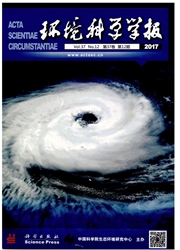

 中文摘要:
中文摘要:
对带有旋流装置的新型序批式反应器(R1)和其对比反应器(R2、R3)的好氧颗粒污泥的形态、粒径、比耗氧速率及动力学参数进行了对比分析.结果表明,在一定范围内提高剪切力能加快颗粒污泥的形成速率和粒径增长速率,但无法有效控制粒径范围.与R2有相同气体表面上升流速的R1,由于其旋流器提供的特殊旋流剪切力和摩擦力能延缓其污泥颗粒化进程,从而有效控制了颗粒粒径的增长;R1、R2、R3的SOUR分别0.80、0.48和0.32 mg.h-1mg-1,表明新型反应器R1培养的好氧颗粒污泥活性较高;通过对动力学参数分析,R1中的维持系数m和非生长基质消耗比例Smin/CODinfluent分别为0.13 h-1和9%,均大于R2(0.077 h-1,9%)和R3(0.084 h-1,1%),表明水力旋流条件不仅可以有效控制颗粒的粒径而且提高了颗粒污泥系统的稳定性.
 英文摘要:
英文摘要:
The morphology, diameter, the specific oxygen uptake rate and kinetic parameters of aerobic granular sludge in the new sequencing batchreactor ( R1 ) and its contrasts ( R2, R3) were analyzed and compared in this study. R1 used hydraulic cyclone flow condition to control the particle size and maintain granular sludge system stable. Results showed that increasing shear force could speed up the formation of granular sludge and the sizeincrease, but the granule size could not be controlled. However, RI with hydrocyclone had the same surface gas upflow velocity as R2 that can provide hydrocyclone shear force and friction force which may slow down the granulation process and control the granular diameter. The SOUR in R1, R2 and R3were 0.80, 0.48 and 0.32 mg·h^-1·mg^-1 , respectively, which proved that granular sludge is more active in the new reactor (R1). Kinetic parameters analysis showed that maintenance coefficient m and non-growth-related substrate consumption ratio Smin/CODinfluent in R1 were 0.13 h^-1 and 9% , whichwere higher than R2 (0. 077 h-1 ,9% ) and R3 (0. 084 h^-1,1% ). This indicated that hydraulic cyclone could effectively control the granular diameter and improve the stability of granular sludge system.
 同期刊论文项目
同期刊论文项目
 同项目期刊论文
同项目期刊论文
 期刊信息
期刊信息
